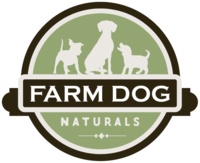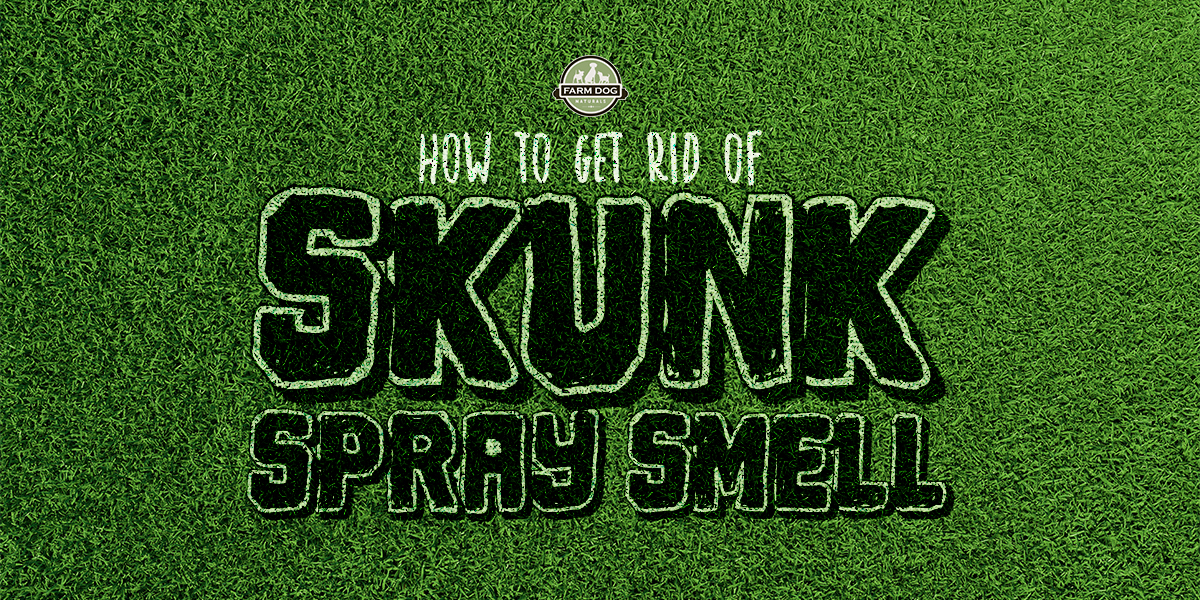I’d wager a guess that, if you have a dog, at least once you’ve had to deal with it. The smell of skunk on a dog is so strong, and can last so long. It gets into your home, and can follow your dog around for ages. And we won’t even mention what happens when it rains…
And it really doesn’t help that a skunk can spray up to 10 feet and can spray as many as 6 times in a row!! Unfortunately, often before we even know the skunk is in our pet’s sight, it’s too late!
So, what happens when it happens? How do you safely get rid of the smell, without worrying about the chemicals in many commercial skunk spray shampoos and removers?
When Skunk Spray Happens…
First off, its important to note that, if your dog gets sprayed, you want to be sure she’s ok first!
Skunk spray contains volatile compounds that may get into the nose or mouth. If that happens, you might notice drooling, vomiting, or your pet rubbing her face as if it’s itchy. If it gets in her eyes, temporary blindness may occur. These are are, but they can happen.
Even more rare are things called Heinz body anemia, methemoglobinemia, and hemoglobinuria, any of which may occur a few hours to 24 hours after exposure. These are when the thiols in the skunk spray cause oxidative damage to hemoglobin. The thiols react with oxyhemoglobin in an oxidation-reduction reaction. This reaction forms methemoglobinemia, thiyl radicals, and hydrogen peroxide. Thiyl radicals and hydrogen peroxide are highly reactive and combine with hemoglobin sulfhydryl groups, resulting in Heinz bodies and subsequent hemolysis.
If your dog does get a face full (or body full), keep an eye on her. Contact your vet if you notice anything out of the ordinary.
How to Get Rid of the Smell of Skunk on a Dog
Skunk spray itself is a yellow oil that will cling to most surfaces that contacts; like all oils, it does not mix with water. And because of that, you really don’t want to get your dog wet!
So, DO NOT rush into the bath and start pouring water on your dog. That’s won’t help. The water will actually seal in that the skunk oil secretion into the hair follicle. And that’s what causes the smell to stick around for weeks – even months. To neutralize the smell, you need to break down the oils so that you can wash them off the fur or skin.
Thinking about reaching for some tomato juice? Leave it in the cupboard. It also won’t help.
Another common suggestion? Hydrogen peroxide. It is widely known as a disinfectant for injuries, wounds, or scratches in humans, because it destroys microorganisms. But we’re just not fans of using it on our animals.
It’s easy to overdue it with hydrogen peroxide, or use the wrong type of hydrogen peroxide. It is bleach, don’t forget. It can be toxic to tissue, and it induces vomiting. And it can also discolour or damage your dog’s fur.
It’s also drying. So it you use it after your dog got skunked, it can dry out her skin, which is never a good thing.
Instead, do this:
1. Grab some baking soda and dish soap. If you have natural dish soap, that’s even better. It’s safer to put on your dog’s skin, but regular soap will work too if that’s all you’ve got. You can also use dog shampoo – again, natural is best if you have it. Mix them together to form a paste. Start with:
- 1/4 cup of baking soda
- 1 teaspoon of liquid dishwashing soap
Add more soap if necessary, but you want it to be a thick paste. If you need the mixture to cover more area, double the recipe.
2. Now, work the paste well into the area that’s stinky. Don’t get any in her eyes or nose. Remember, leave the fur dry – don’t get it wet. Let it sit for 20-30 mins, then you’re good to rinse.
Or…
Have something on hand that gets rid of the smell of skunk on a dog with a few simple wipes.
Our Relief Concentrated Pet Cleaner effectively removes the smell of skunk on a dog with just 2 simple, natural, organic ingredients – no chemicals required.
There’s no way around it – the fact is, when your dog gets into an encounter with a skunk, it sucks. Big time. But, before you reach for a bottle of chemical-based skunk shampoo, or make your own with hydrogen peroxide, go the natural route. It works just as well and keeps your pup safe!

